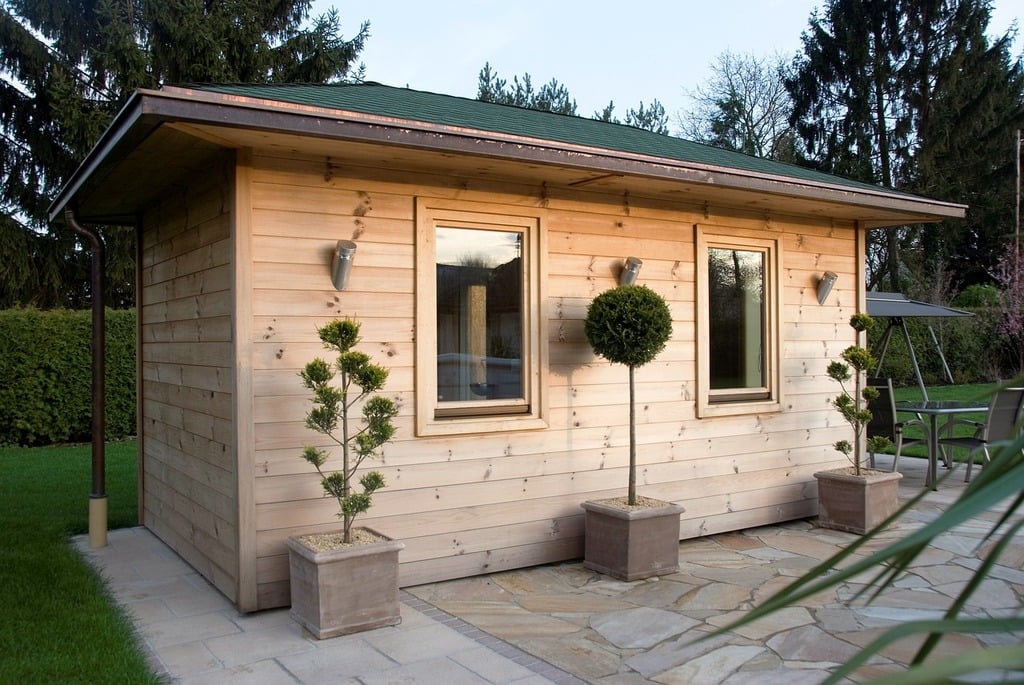Outdoor saunas have gained popularity as a luxurious addition to home wellness spaces. However, before embarking on your sauna project, it’s crucial to understand the permitting requirements and other considerations.
Do You Need a Permit for an Outdoor Sauna?

The short answer is: it depends. Several factors influence whether you’ll need a permit for your outdoor sauna:
Local Regulations
Permit requirements vary significantly based on your location. Some municipalities have strict regulations for outdoor structures, while others are more lenient. It’s essential to check with your local building department or zoning office for specific requirements in your area.
Size and Structure Type
The size and permanence of your sauna play a crucial role in determining permit requirements:
- Smaller, portable saunas often don’t require permits.
- Larger, permanent structures are more likely to need permits.
- Pre-fabricated saunas may have different requirements compared to custom-built ones.
Utilities
If your sauna requires electrical wiring or plumbing, you’ll likely need permits for these installations, even if the structure itself doesn’t require one.
Zoning and Property Lines
Your property’s zoning classification and the sauna’s proximity to property lines can affect permitting:
- Residential zoning may have restrictions on accessory structures.
- There are often setback requirements dictating how close to property lines you can build.
Steps to Determine Permit Requirements
- Contact local authorities: Reach out to your local building department or zoning office.
- Review property documents: Check your property’s deed for any restrictions.
- Consult professionals: Speak with local contractors familiar with building codes.
- Prepare documentation: Gather necessary information about your planned sauna.
The Permitting Process
If you determine that a permit is required, here’s what you can expect:
Application Submission
You’ll need to submit a permit application, which typically includes:
- Detailed plans of the sauna
- Site plans showing the sauna’s location on your property
- Specifications for any electrical or plumbing work
Review Process
The local authorities will review your application. This process can take anywhere from a few days to several weeks, depending on your location and the complexity of your project.
Inspections
If approved, you’ll likely need inspections at various stages of construction:
- Foundation inspection (if applicable)
- Framing inspection
- Electrical and plumbing inspections
- Final inspection
Building Without a Permit: Risks and Consequences
While it might be tempting to skip the permitting process, doing so can lead to serious consequences:
- Fines and penalties
- Forced removal or modification of the structure
- Complications when selling your property
- Safety risks due to non-compliance with building codes
Safety Considerations
Even if a permit isn’t required, ensure your sauna meets safety standards:
- Proper ventilation
- Safe heating elements
- Appropriate electrical installations
- Fire safety measures
Environmental Impact
Consider the environmental aspects of your outdoor sauna:
- Energy efficiency
- Sustainable materials
- Water usage and drainage
1. How much does a permit for an outdoor sauna typically cost?
Permit costs vary widely depending on your location and the specifics of your project. In some areas, permits might cost as little as $50-$100, while in others, they could run into several hundred or even thousands of dollars. Factors affecting the cost include:
- Your location
- The size and value of the project
- The types of permits required (building, electrical, plumbing, etc.)
It’s best to check with your local building department for accurate pricing in your area.
2. How long does the permitting process usually take?
The timeline for obtaining a permit can vary significantly:
- In some cases, you might get approval in as little as a few days to a week.
- More commonly, the process takes 2-6 weeks.
- In areas with stricter regulations or during busy seasons, it could take 2-3 months.
Factors influencing the timeline include the complexity of your project, the current workload of your local permitting office, and how quickly you can provide any additional information requested.
3. Can I install a pre-fabricated sauna without a permit?
While pre-fabricated saunas sometimes have different requirements than custom-built ones, they’re not automatically exempt from permitting. Whether you need a permit depends on:
- Local regulations
- The size of the sauna
- Whether it’s a permanent or portable structure
- Electrical and plumbing requirements
Even if the structure itself doesn’t require a permit, you may need one for electrical work. Always check with local authorities to be sure.
4. What happens if I build a sauna without a required permit?
Building without a required permit can lead to several issues:
- Fines: You may face monetary penalties, which can increase over time.
- Removal orders: You might be required to remove the structure entirely.
- Retroactive permitting: You may have to go through the permitting process after the fact, which can be more expensive and complicated.
- Selling difficulties: Unpermitted structures can complicate property sales or refinancing.
- Insurance issues: Your homeowner’s insurance may not cover incidents involving unpermitted structures.
It’s always better to check and comply with permitting requirements from the start.
5. Are there any exceptions to outdoor sauna permit requirements?
Some common exceptions include:
- Small, portable saunas that aren’t permanently affixed to the ground.
- Saunas below a certain size threshold (e.g., under 120 square feet in some jurisdictions).
- Saunas in very rural areas with minimal building regulations.
